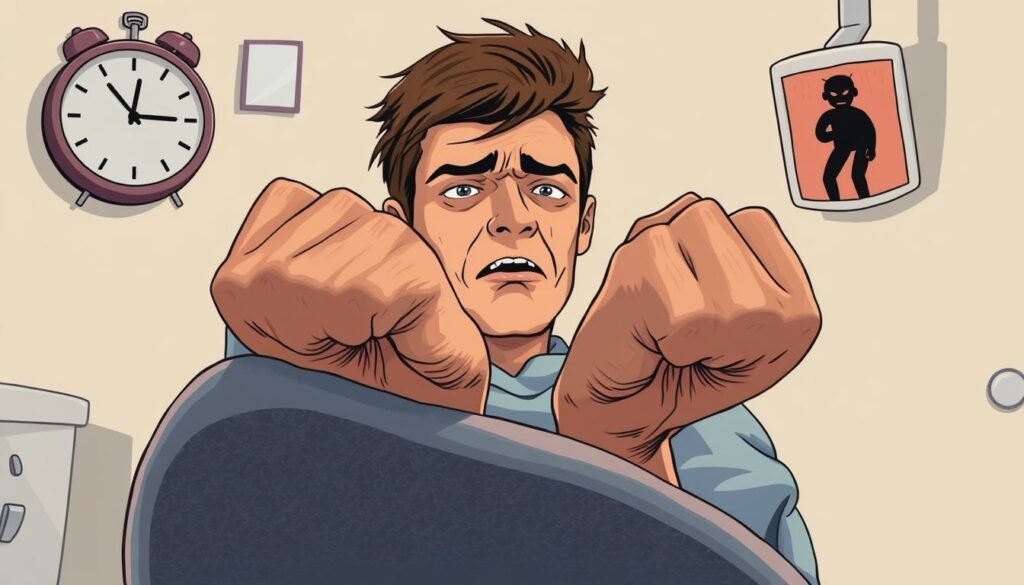About 20% of Americans visit the dentist only when they must. Meanwhile, almost 8% avoid dental visits entirely. This problem is called dentist anxiety. It affects many people countrywide. This article shares expert tips and solutions for overcoming dental fears and managing anxiety. By talking openly with dentists, trying relaxation methods like mindfulness, and exploring options like therapy dogs or sedation, individuals can face dental care without fear. Understanding the emotional and psychological sides of dental visits is key. Ignoring these can lead to major oral health problems.
Key Takeaways
- Dental anxiety is a common issue that affects a significant percentage of the population.
- Open communication with your dental team can greatly reduce anxiety levels.
- Utilizing distractions like music or stress toys may help in relaxing patients during visits.
- Strategies such as mindfulness and breathing techniques can be effective in managing anxiety.
- Therapy animals, like the pets at Modern Age Dentistry, can provide comfort and ease fears.
- Regular dental visits are essential for overcoming anxiety and maintaining oral health.
- Finding the right dentist who understands patient needs is vital for reducing anxiety.
Understanding Dentist Anxiety
Dental anxiety stops many from getting the dental care they need. It can show up in different ways, such as fear of the dentist’s office. This might be due to certain treatments or bad experiences before. It’s important to know about dental anxiety and how common it is. This helps us find ways to deal with it better.
What is Dentist Anxiety?
Dentist anxiety includes different types of worry or fear about going to the dentist. People might feel very scared of dental visits. This fear often comes from bad experiences, stories from others, or fear of pain from dental work. Some only go to the dentist when the pain is too much to ignore.
Prevalence of Dental Anxiety in the Population
A lot of people, between 9% and 20% of Americans, avoid the dentist because of anxiety or fear. This leads to worse oral health, like more missing or decayed teeth. Fear of needles and worries about anesthesia also play a big role. In fact, dental anxiety is one of the top five anxieties people have.
Talking about your worries with a dentist you trust can help lessen the fear of going. It’s key for feeling more at ease and getting better dental care.
| Factor | Impact on Dental Visits |
|---|---|
| Dental Anxiety | Leads to avoidance of necessary care |
| Fear of Pain | Causes significant delays in treatment |
| Needle Fear | Heightens anxiety during procedures |
| Concerns about Anesthesia | Increases reluctance to visit the dentist |
Common Causes of Dental Anxiety
Understanding the fear of dentists is key to managing dental anxiety. Many people get nervous due to various reasons. By knowing these reasons, patients can share their worries with dentists. This helps make dental visits less scary.
Fear of Pain or Discomfort
Many fear the dentist because they don’t want to feel pain. Most dental work doesn’t hurt, but the fear keeps people away. This leads to poor dental health over time.
Previous Traumatic Experiences
Some have had bad experiences with dentists before. These bad memories can make them very anxious about going again. It’s important to talk about these past visits with your dentist.
Fear of Needles and Drilling
The fear of needles and the sound of drilling is common. For those with dental phobia, seeing needles can cause panic. Talking about these fears and learning calming techniques can help.
Concerns About Control and Vulnerability
Feeling out of control in the dentist’s chair is common. This can make patients worry more and feel anxious. Talking about the treatment and finding ways to manage anxiety can make a big difference. For more help on dealing with anxiety, check out this guide.

Recognizing Symptoms of Dental Anxiety
Many people feel nervous about going to the dentist. It’s important to know how dental anxiety shows up. By knowing these symptoms, we can start to overcome our fear. Symptoms can be physical, mental, or how we act.
Physical Symptoms: Heart Palpitations and Sweating
Body signs can show you’re anxious about the dentist. People might feel:
- Heart palpitations
- Excessive sweating
- Trembling hands
- Nausea or gastrointestinal distress
These signs can happen before or during your visit to the dentist. They come from feeling really stressed about what might happen.
Mental Symptoms: Panic Attacks and Feelings of Faintness
Your mind plays a big part in dental fear. You might experience:
- Panic attacks with a lot of fear
- Feelings of faintness or dizziness
- Constant worry about going to the dentist
Mental symptoms can make it hard to go to important appointments.
Behavioral Symptoms: Avoidance and Aggression
How we behave can also show dental fear. Some signs are:
- Skipping dentist visits
- Getting mad at dental staff or when talking about teeth
- Not wanting to take care of your teeth at home
Without dealing with this fear, it gets worse. This leads to bigger dental problems. A kind dentist is key to facing these fears. Talking helps a lot. For more tips on dental anxiety, check out this resource.

Effective Strategies for Overcoming Dentist Anxiety
Dental anxiety is common. It’s important to find ways to handle it. By doing so, dental visits become less scary.
Communicate Your Fears to Your Dentist
Talking helps. Tell your dentist what worries you. They can change their approach to make you comfortable.
Establish a Signal for Comfort During Procedures
A simple signal during a procedure can help you. Raising a hand lets you take a break. This gives you control and less stress.
Bring Distractions to Your Appointment
Distractions can lower your anxiety. Bring your favorite music or a stress ball. This helps keep your mind off the dental work.

| Strategy | Description | Effect on Anxiety |
|---|---|---|
| Open Communication | Discussing fears with the dentist | Reduces feelings of isolation |
| Comfort Signal | Establishing a hand signal to pause | Increases sense of control |
| Distractions | Using music or stress relief items | Diverts attention from anxiety |
These strategies make managing dentist anxiety easier. They encourage you to take part in your dental care. With these methods, you can feel more at ease during appointments.
Coping Mechanisms Before Your Visit
It can be tough to get ready for a dentist appointment, especially if you feel nervous. But using coping tricks beforehand can help. Mindfulness and guided imagery are two great ways. They help you focus and feel less stressed before your appointment.
Mindfulness and Breathing Techniques
Mindfulness means staying in the moment and not worrying. It helps fight off anxious thoughts. Doing simple breathing exercises helps a lot. Taking slow, deep breaths helps calm your heart rate and relax. This method helps you stay mindful and not think about dental worries.
Guided Imagery and Visualization
With guided imagery, you imagine being in a calm place. This mental getaway helps lessen stress and fear. Doing this often can help you feel more relaxed before seeing the dentist. Using these techniques can make dental visits easier to handle. Visit this helpful guide for more tips on managing dental anxiety.
Methods to Manage Anxiety During the Appointment
Going to the dentist can be scary for many people because of their nerves. But, using certain tricks can make the visit smoother. One can listen to songs or watch movies to distract themselves. Or, they might bring a friend for moral support.
Using Music and Movies as Distraction
Dental offices often offer music or movies to help patients relax. These distractions can make a big difference. They help patients forget about the procedure and enjoy their time instead. It makes the dental visit seem friendlier and less stressful.
Friend Support: Bringing a Companion
It also helps to have someone you trust with you. A friend or family member’s presence can calm your anxiety a lot. They offer emotional support which makes a dental visit much less intimidating. With their help, facing dental work feels a whole lot easier.
The Role of Sedation in Dental Procedures
Sedation offers a way to help people who fear dental visits. It provides various options for different needs. This lets patients get treatments comfortably and with less worry.
Different Types of Sedation Options
There are several sedation methods for patients:
- Nitrous Oxide: Known as laughing gas, it’s a top choice because it works quickly to calm nerves. Patients stay awake but feel less anxious.
- Oral Sedation: This requires taking meds like Valium, Xanax, or Ativan before seeing the dentist. It might make patients sleepy enough to nap.
- IV Sedation: For deeper relaxation, IV sedation goes right into the veins. It’s the deepest relaxation type, sometimes making patients forget their dental work.
- General Anesthesia: Used for extreme dental fear, especially in kids or those with special needs. It ensures a procedure without any pain.
Understanding Nitrous Oxide and Its Benefits
Nitrous oxide is great for easing dental worries. It helps patients stay calm and reduces the gag reflex for smoother procedures. Everyone, regardless of age, can find nitrous oxide helpful for less scary dental visits.
Using sedation in dentistry helps people deal with their fear, keep their teeth healthy, and face big treatments easier. Choosing sedation means better comfort and access to vital dental care for those who’d rather not go at all.
| Sedation Type | Level of Sedation | Administration Method | Ideal For |
|---|---|---|---|
| Nitrous Oxide | Minimal to Moderate | Inhalation | General anxiety, quick procedures |
| Oral Sedation | Moderate | Ingestion | Strong gag reflex, needle phobia |
| IV Sedation | Deep | Intravenous | Extensive work, severe anxiety |
| General Anesthesia | General | Inhalation or Intravenous | Children, special needs, severe cases |
The Importance of Regular Dental Visits
Everyone needs to take care of their dental health. That’s why visiting the dentist regularly is key. These check-ups help catch issues like cavities and gum disease early. Early detection means problems can be fixed before they get worse, saving time and money.
Maintaining Oral Health Through Consistency
Seeing your dentist often is crucial for healthy teeth. Experts suggest a dental visit every six months. This routine helps find dental problems early and highlights the importance of preventing disease. At these check-ups, dentists give personalized advice. They address any concerns, which helps patients feel at ease.
Open talk with your dentist helps beat dental fears. This makes regular dental visits less scary.
Addressing Concerns Before Treatment
It’s important for patients to talk about their dental fears. This lets dentists make visits less stressful. They might explain procedures or suggest calming techniques.
This approach helps patients feel safe and understood. Feeling secure encourages them to take care of their dental health.
Check out this link for tips on handling anxiety. These strategies help with mental and dental health.